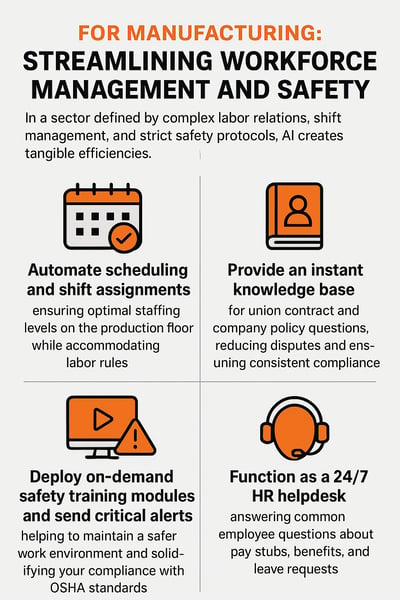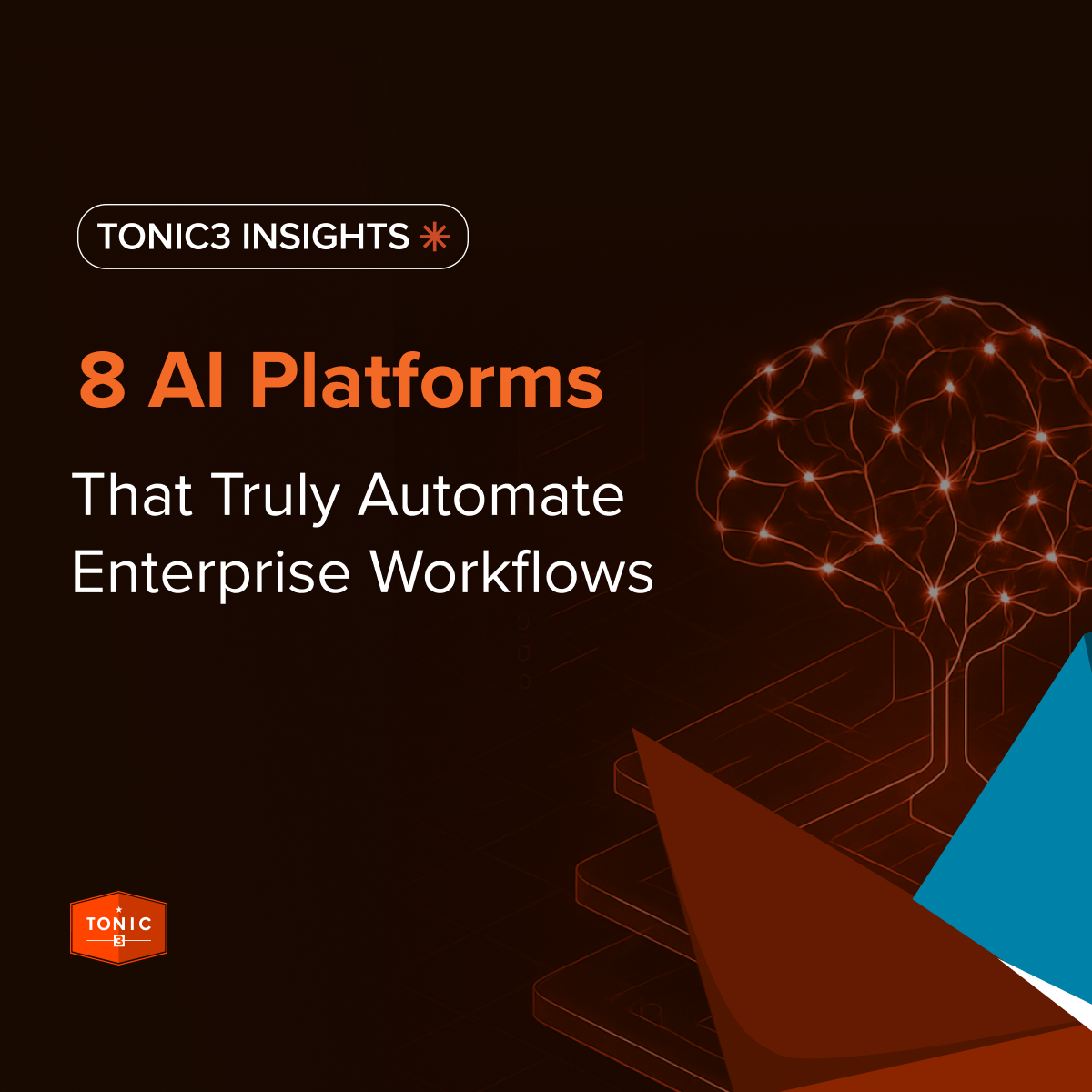Shift HR Productivity with AI: From Transactional to Strategic Impact
The Current HR Dilemma: Reactive vs. Proactive In today's fast-paced, hybrid workplace, HR teams face the challenge of being stretched thin. The...
Tonic3 develops and executes strategies that drive profit through Digital Transformation. Practically that means we are built to help clients hone the right strategy, implement the right technology, and build the right long-term capabilities to deliver lasting transformation.
Industries
We believe that effective technology helps people succeed in their daily lives. So we help our clients engineer useful technology for their clients, partners, and employees. That translates to every major industry, but over the years we’ve developed several core areas of expertise.

Why read this article?
Understand Practical AI: Learn what AI automation means for your daily HR tasks, moving beyond the tech buzzwords.
Get Industry-Specific Solutions: See how AI directly solves challenges in manufacturing, pharma, and CPG/retail.
Boost Efficiency, Not Headcount: Discover how automation frees your team for strategic work, rather than replacing them.
Find a Clear Starting Point: Get a simple framework to begin implementing AI with focused, high-impact projects.
Optimize Key HR Workflows: Learn how AI can improve and scale your recruiting, onboarding, and compliance management.
Managing a high-volume workforce in manufacturing, navigating strict GxP compliance in pharmaceuticals, or handling seasonal hiring surges in retail presents a unique set of daily challenges. For HR leaders in these sectors, the core mission is the same: attract and retain top talent while ensuring operational efficiency. But the 'how' is becoming increasingly complex.
From union negotiations to the intense search for specialized R&D roles, your team is stretched thin. So, how do you become more strategic and employee-centric when administrative tasks consume most of your time?
The answer is found in leveraging Artificial Intelligence (AI) and intelligent process automation to handle the heavy lifting.
Let’s move past the buzzwords. In a practical sense, applying AI to HR is about using smart, automated systems to execute repetitive tasks and uncover data-driven insights. It's a digital assistant that can screen thousands of résumés for specific skills or provide employees with instant, 24/7 answers to their policy questions.
Intelligent process automation takes this a step further. As we've explored in our post on how to drive efficiency with agentic process automation, Generative AI is redefining process automation, this involves creating AI-driven "agents" that can manage entire workflows. An agent could, for example, autonomously handle the new-hire onboarding process—from sending the offer letter to scheduling training and enrolling the employee in benefits—without manual intervention.
By integrating these technologies, you build a more efficient, data-informed, and people-focused HR function.
The true value of AI in HR is its adaptability. It can be precisely configured to solve the core problems specific to your sector. Consider how AI-powered tools like HR chatbots and automated workflows can address your industry's unique challenges. Read more about how HR leaders can use quick AI wins for strategic growth.
In a sector defined by complex labor relations, shift management, and strict safety protocols, AI creates tangible efficiencies. An integrated AI system can:
Automate scheduling and shift assignments, ensuring optimal staffing levels on the production floor while accommodating labor rules.
Provide an instant knowledge base for union contract and company policy questions, reducing disputes and ensuring consistent compliance.
Deploy on-demand safety training modules and send critical alerts, helping to maintain a safer work environment and solidifying your compliance with OSHA standards.
Function as a 24/7 HR helpdesk, answering common employee questions about pay stubs, benefits, and leave requests.

For Pharmaceuticals: Accelerating Specialized Talent Acquisition and Compliance
The pharmaceutical industry requires highly specific talent and unwavering adherence to regulations. AI helps you meet these demands by:
Speeding up talent acquisition for R&D, clinical, and scientific roles by using AI to screen and identify qualified candidates with niche expertise, cutting time-to-hire significantly.
Automating GxP and regulatory compliance training, tracking completion, and maintaining audit-ready documentation.
With high turnover, seasonal hiring peaks, and geographically dispersed teams, CPG and retail HR is a constant balancing act. AI provides the scale and speed you need by:
Automating the recruitment and onboarding process for hundreds of seasonal or frontline staff simultaneously, allowing you to scale your workforce up or down with demand.
Using AI chatbots to conduct regular pulse surveys, gathering real-time, actionable feedback on employee sentiment to proactively address issues and reduce turnover.
Facilitating personalized communication and recognition programs to keep a distributed workforce connected and engaged with company goals.
As detailed in a recent analysis by HR Curator on HR chatbots, the benefits of integrating AI are clear: significant gains in efficiency, reduced operational costs, a better and more consistent employee experience, and data-backed decision-making.
The goal of this technology is not to replace the critical human element of HR. Instead, it’s about augmenting your team. By automating the administrative burden, AI frees up your HR professionals to focus on what they do best: strategic workforce planning, developing talent, and fostering a strong company culture.
Read more: Shift HR Productivity with AI: From Transactional to Strategic Impact (English)
Adopting AI-driven automation doesn't require a complete departmental overhaul. The most successful implementations begin by identifying one or two key operational bottlenecks and deploying a targeted AI solution to solve them.
AI-powered HR automation uses smart technology to handle repetitive, administrative tasks. This includes screening resumes, answering common employee policy questions, managing work schedules, and tracking compliance training. It allows the HR team to focus on more strategic, human-centered work.
No. The goal of AI in HR is to augment the capabilities of HR professionals, not replace them. By automating administrative tasks, AI frees up managers and specialists to focus on strategic workforce planning, leadership development, company culture, and employee relations—areas where human judgment and empathy are essential.
In manufacturing, AI can automate complex shift scheduling to ensure production line coverage, provide instant access to information on union agreements and safety policies (like OSHA compliance), and streamline the onboarding for new factory floor operators.
The biggest benefit is the speed and accuracy of acquiring highly specialized talent (e.g., for R&D, scientists). AI can parse thousands of profiles to find candidates with the exact niche qualifications required. It also automates the management and tracking of GxP compliance training, ensuring the team is always up-to-date and audit-ready.
Start small and stay focused. Identify the single most time-consuming, repetitive process in your department—like the initial screening of candidates for high-volume roles or answering basic benefits questions. Implementing a simple HR chatbot or a targeted automation tool to solve that one problem can deliver a clear ROI and build the case for future investment.

The Current HR Dilemma: Reactive vs. Proactive In today's fast-paced, hybrid workplace, HR teams face the challenge of being stretched thin. The...
.png)
Why read this article? Discover what agentic process automation really means—and why it’s more than just another tech trend. Learn how CTOs and...

In today's fast-paced business world, the promise of Artificial Intelligence (AI) and Large Language Models (LLMs) to revolutionize enterprise...